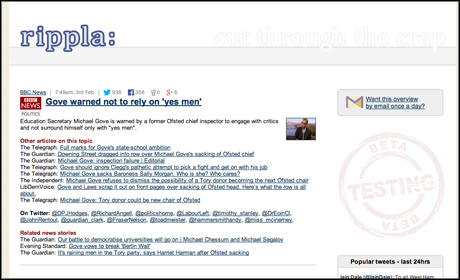
Rippla, a site which aims to track the "social media ripples" of news organisations, has announced a new beta release with a focus on distinguishing hard news from link bait on the web.
Originally launched by journalist Sunny Hundal in 2011, the site ranked headlines from 10 major news sites by how many social shares they had and on which platforms.
Now though, the site – which has the tagline "cut through the crap" – has been revamped with a bigger emphasis on surfacing content being discussed by "influential people".
"This time around Rippla doesn't focus entirely on social data, it's more on the sources," explained Hundal, a political reporter who writes for the Guardian and Al-Jazeera, among others.
"It's less dependent on how many people are talking about it and more dependent on who is talking about it. To me, it's like Google News on steroids."To me, it's like Google News on steroidsSunny Hundal, Rippla
The original Rippla proved popular with news organisations and PR companies, says Hundal, and although he adds that the site "wasn't necessarily high traffic" it did result in him being asked to develop a bespoke Rippla for a national news organisation.
Ofcom also used Rippla data in its 2012 annual industry report to show how social media was affecting the British media.
The problem with the first platform, Hundal says, was that it was "too broad".
Although the site was intended to pick up on harder news, Hundal found it was picking up a lot of stories "that weren't really relevant."
"I have a high news consumption and the site came partly out of a need for me to know quickly the most important information I need to read and know about from the day's news," he explained.
However, based on social shares Rippla sometimes gave a high ranking to "random stories," he said, "things like a gorilla taking a picture" – the opposite of the kind of news he was looking for.
One thing Hundal has noticed since Rippla first came about, he says, is the way news outlets have responded to how social media affects sharing.
"I saw a lot of newspapers, especially the Daily Mail, change their stories in response to the rise of the likes of Facebook," he said.I saw a lot of newspapers change their stories in response to the rise of the likes of FacebookSunny Hundal, Rippla
"They would make their stories more click-baity, there would be more images in them and they would do those kind of stories which explicitly were about sharing online."
Consequently, Hundal shut down Rippla in late 2012 to work on a more "souped-up version" aimed at surfacing only the highest quality news – and in particular political news – on the web.
The new Rippla works on what Hundal describes as a "cluster model" which surfaces quality content based on how many different people and platforms are talking about a particular topic.
At present Rippla incorporates Facebook and Twitter as well as, for the first time, blogs. With some development, Hundal plans to to also integrate it with Reddit, Youtube, Instagram and other social platforms.
"Even if a story doesn't have that many shares on Twitter and Facebook but you can see there's a cluster of lots of other media and influential people talking about the same story, then that content – in a broader sense – is important," he explained.
The cluster model is determined by keywords, a tactic Hundal admits "is not perfect" at this stage – one of the reasons the platform is still in beta.
And although Rippla is semi-automated Hundal says there is still "quite a bit of manual work" involved to ensure quality control.
For example, Hundal has curated a Twitter list of "the 400 most influential people who talk about politics" which helps to inform Rippla's ranking of top stories.

Screenshot from Rippla.com
However, Hundal's future plans for Rippla include making it more automated and expanding the platform to cover different topics, such as science or sport.
He also sees opportunities for monetisation. On the previous platform, for example, a widget which allowed users to enter the URL of a news story to see its social media "ripples" proved particularly popular with PR companies.
This, along with an email subscription function, is something he plans to make a paid-for feature on the new Rippla.
Hundal is not yet sure when the platform will be out of beta; for the moment though, he is focussing on "nailing down" the algorithm and coding in the existing platform.
"I know there are a lot of other people out there too who don't want to have to wade through loads of news pages or tweets just to see what's going on, because they've got busy work schedules," he said.
"And so Rippla fits that need. If it works for me, then it must work for other people too."
Free daily newsletter
If you like our news and feature articles, you can sign up to receive our free daily (Mon-Fri) email newsletter (mobile friendly).
Related articles
- Journalists are happy to be disconnecting from platforms, should news organisations be worried?
- Protecting journalists on social media, with Valérie Bélair-Gagnon
- What will your audience want in the future?
- Five key takeaways from the UK select committee on the future of news
- 15 free sources of data on the media industry









